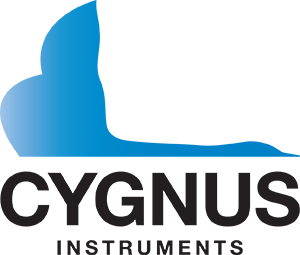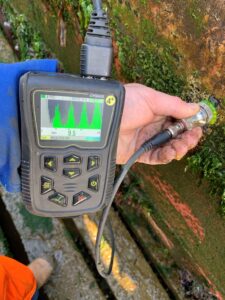Thickness Measurement Equipment
Welcome to Cygnus Instruments, a trusted name in the world of ultrasonic thickness measurement equipment. With a legacy of over 40 years since our establishment in 1983, we have amassed unparalleled expertise and experience in the industry.
As pioneers of the Multiple Echo testing standard, we have revolutionized the field with our cutting-edge solutions. Our wide range of ultrasonic thickness gauges is designed to cater to diverse requirements, offering precise measurements and reliable performance. Recognized by marine surveyors and utilized across industries globally, our instruments have become the go-to choice for professionals seeking accuracy and quality.
At Cygnus Instruments, we take pride in our highly experienced and knowledgeable team, always ready to provide expert guidance and support. For all your thickness measurement needs, contact us at +1 346 223 0415. Experience the advanced features and specifications of our instruments and discover why Cygnus Instruments stands out as a leader in the industry.
How Thickness Measurement Equipment Works?
Thickness measurement equipment is a crucial tool used in various industries for accurate scan and measurement of material thickness. These instruments, often referred to as thickness gauges, employ innovative technology to measure the thickness of objects and surfaces.
A thickness measurement instrument typically consists of a transducer probe, display unit, and associated electronics. The transducer probe emits ultrasonic waves towards the material being inspected. These waves travel through the material and reflect back to the probe after encountering the opposite surface or a back wall.
The instrument measures the time it takes for the ultrasonic waves to travel to and from the material. By knowing the speed of sound in the material, the instrument can calculate the thickness based on the time of flight of the ultrasonic waves.
The measurement process begins with the operator applying a coupling medium, such as gel or oil, to ensure proper sound transmission between the transducer probe and the material. The probe is then placed on the surface, and the instrument emits a pulse of ultrasonic waves. The reflected waves are received by the probe and converted into an electrical signal, which is processed by the instrument’s electronics.
The display unit of the thickness gauge shows the measured thickness value, allowing the operator to read and record the results. Some advanced instruments also provide additional features such as:
- Data Logging
- Statistical Analysis
- Customizable Settings for Different Materials
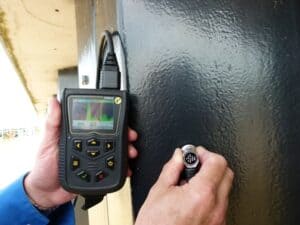
Accurate measurement is crucial for quality control, safety assessment, and determining the structural integrity of various components in industries like manufacturing, construction, and maintenance. Thickness measurement instruments enable inspectors and technicians to ensure compliance with specified thickness standards, detect corrosion or erosion, monitor material wear, and identify potential areas of concern.
With the ability to measure thicknesses ranging from micrometers to several inches, these instruments provide invaluable information for decision-making and preventative maintenance. They are used in a wide range of applications, including pipeline inspection, tank and vessel inspection, metal fabrication, automotive manufacturing, and aerospace industry.
In summary, UTM thickness measurement equipment, such as the modern thickness gauge, plays a vital role in accurate inspection and measurement. By utilizing ultrasonic technology, these instruments enable operators to measure and monitor material thickness with precision, enhancing quality control and safety in various industries.
Ultrasonic Thickness Gauges vs Traditional Thickness Testing Standards
When it comes to measuring material thickness, different testing methods are available, each with its advantages and limitations. In this comparison, we will explore the benefits of Handheld ultrasonic thickness gauges in comparison to other common testing methods.
Ultrasonic Thickness Gauges:
Ultrasonic thickness gauges offer numerous advantages. They provide non-destructive testing, meaning they do not damage the material being measured. They are also highly accurate and can measure thicknesses ranging from thin coatings to thick structures.
Ultrasonic gauges are portable, easy to use, and provide real-time results. They are suitable for a wide range of materials, including metals, plastics, composites, and more. Additionally, they can measure through painted or coated surfaces, making them highly versatile for various applications.
Calipers and Micrometers:
Calipers and micrometers are widely used for simple thickness measurements. However, they are limited in their ability to measure through coatings or inaccessible areas. They also require direct contact with the material, which can be impractical or impossible in certain scenarios. Calipers and micrometers are more suitable for measuring thicknesses of relatively thin and easily accessible materials.
Visual Inspection:
Visual inspection is a common method for estimating thickness visually. While it may provide a quick estimate, it lacks accuracy and precision. Visual inspection alone cannot provide reliable measurements, especially for materials with complex geometries or those requiring precise thickness data.
Radiographic Testing:
Radiographic testing, such as X-rays or gamma rays, can measure material thickness. However, it requires specialized equipment and trained personnel. It is also time-consuming and may involve safety considerations. Radiographic testing is more suitable for thicker and denser materials, where penetrating radiation can effectively measure the thickness.
Eddy Current Testing:
Eddy current testing is primarily used for detecting surface cracks or flaws. It can provide limited information about material thickness, particularly for conductive materials. However, it may not be as accurate or versatile as ultrasonic thickness gauges, especially when measuring through coatings or non-conductive materials.
In summary, ultrasonic thickness gauges offer significant advantages compared to other testing methods. They provide non-destructive testing, high accuracy, real-time results, and versatility across a wide range of materials.
While other methods like calipers, visual inspection, radiographic testing, and eddy current testing have their applications, ultrasonic thickness gauges excel in providing accurate and efficient thickness measurements, making them the preferred choice for many industries.
The Three Testing Standards – Single Echo, Echo to Echo, and Multiple Echo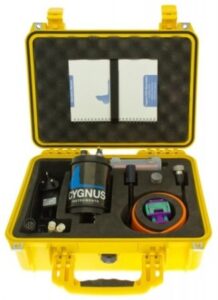
Ultrasonic thickness gauges utilize different standards for measuring material thickness:
- Single Echo
- Echo to Echo
- Multiple Echo
Each standard has its advantages and considerations, but Multiple Echo has become the industry standard for several reasons.
Single Echo:
Single Echo is the simplest standard where the gauge measures the time it takes for the ultrasonic wave to travel to the material and back from the first back wall echo. It provides a quick measurement but may be influenced by surface conditions, coatings, or roughness, affecting accuracy. It is suitable for applications where surface conditions are controlled and coatings are thin or non-existent.
Echo to Echo:
Echo to Echo, also known as ThruCoat or ThruPaint, measures the thickness of the metal substrate beneath coatings or paint layers. By measuring from the front surface to the metal substrate, it eliminates the influence of coatings. However, it has limitations when the coatings are too thick or when measuring non-metallic substrates.
Multiple Echo:
Multiple Echo, also called the Multiple Echo Average or Multiple Echo Technique (MET), is considered the industry standard for accurate thickness measurements. It measures through coatings and provides highly reliable and precise readings. Multiple Echo gauges use probes that generate multiple back wall echoes.
These echoes are measured and analyzed to determine the thickness of the material. The technique compensates for coating thickness variations and allows accurate measurements even with thick coatings. Additionally, it can handle extreme measuring ranges and deliver accurate results on various materials, including those with rough surfaces.
The Multiple Echo standard is preferred in industries where precise thickness measurements are critical, such as manufacturing, construction, and marine sectors. It ensures accuracy, minimizes errors caused by coatings or surface conditions, and provides consistent and reliable thickness measurements.
Furthermore, Multiple Echo is compatible with a wide range of array probes, allowing for enhanced flexibility and adaptability to different applications and materials. Its versatility, accuracy, and reliability have contributed to its widespread adoption as the industry standard for ultrasonic thickness measurements.
To summarize, while Single Echo and Echo to Echo standards have their applications, Multiple Echo has become the industry standard for accurate thickness measurements. Its ability to measure through coatings, compatibility with probes, handling of extreme measuring ranges, and high accuracy make it the preferred choice in thickness measurement equipment.
By utilizing Multiple Echo with the correct probes, industries can achieve precise and reliable thickness measurements, ensuring quality control and safety across various sectors.
Applications of Thickness Measurement Equipment in Various Industries
Precision thickness measurement meters play a crucial role in various industries, enabling precise measurements and ensuring quality control and safety. From manufacturing and construction to aerospace and automotive sectors, here are some examples of how thickness measurement meters are applied in different industries.
Manufacturing Industry
In manufacturing, thickness measurement meters are used to verify the thickness of raw materials, components, and finished products. It ensures compliance with specifications and helps maintain consistent quality. For example, in sheet metal fabrication, thickness gauges are employed to measure the thickness of metal sheets during production, ensuring they meet design requirements.
Similarly, in the plastic manufacturing industry, thickness measurement equipment helps maintain precise thickness control for plastic sheets, films, and extruded products.
Construction Industry
In the construction industry, thickness measurement meters are utilized for various purposes. For instance, in concrete construction, ultrasonic thickness gauges are used to measure the thickness of concrete cover over reinforcing steel, ensuring structural integrity and adherence to building codes.
In roofing applications, thickness gauges help measure the thickness of roofing materials such as membranes, ensuring proper installation and durability. Additionally, in pipeline construction, corrosion gauge and other pipe thickness measurement instruments are used to assess the thickness of pipe walls, detect corrosion, and ensure pipeline safety.
Marine Industry
In the marine industry, thickness measurement equipment is crucial for the inspection and maintenance of vessels and offshore structures. Ultrasonic thickness gauges are used to measure the thickness of ship hulls, decks, and other critical components to assess corrosion levels and structural integrity.
By monitoring thickness, potential risks and maintenance needs can be identified, ensuring the safety and seaworthiness of marine assets.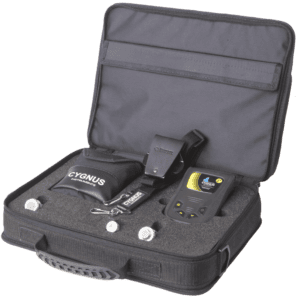
Aerospace Industry
The aerospace industry relies on precise thickness measurements for the fabrication and maintenance of aircraft components. Thickness gauges are used to measure the thickness of materials such as aircraft skin, composite panels, and coatings.
Accurate measurements are essential to ensure compliance with aerodynamic specifications, weight considerations, and safety standards. Additionally, thickness measurement equipment is employed during non-destructive testing (NDT) to inspect and evaluate the integrity of critical aircraft components.
Automotive Industry
In the automotive industry, thickness measurement equipment is utilized throughout the manufacturing process to ensure consistent quality and meet design specifications. For example, during the production of automotive body panels, thickness gauges help verify the thickness of stamped metal parts, ensuring they meet dimensional tolerances.
In the tire manufacturing process, thickness measurement equipment is used to monitor the thickness of rubber layers, ensuring uniformity and performance. Additionally, in the automotive refinishing industry, thickness gauges are employed to measure paint thickness, ensuring proper application and avoiding issues such as uneven paint coverage or potential corrosion risks.
Petrochemical Industry
The petrochemical industry relies on thickness measurement equipment for various applications. For instance, in storage tanks and pipelines, ultrasonic thickness gauges are used to monitor the thickness of metal surfaces, detecting corrosion, erosion, or other forms of degradation.
This information helps in determining maintenance schedules and preventing leaks or structural failures. Thickness measurement equipment is also employed during the manufacturing of pipes, ensuring compliance with standards and maintaining consistent wall thicknesses.
Power Generation Industry
In the power generation sector, thickness measurement equipment is utilized for assessing the integrity of power plant components. For example, in boilers and heat exchangers, thickness gauges help measure the thickness of tubes, ensuring efficient heat transfer and identifying any corrosion or erosion issues. In wind turbine blade manufacturing, thickness measurement equipment is used to monitor the thickness of composite materials, ensuring proper strength and performance.
These are just a few examples of how thickness measurement equipment is applied in various industries. Its versatility, accuracy, and non-destructive nature make it an essential tool for quality control, safety assessment, and maintenance activities across different sectors. By ensuring precise thickness measurements, industries can enhance product quality, improve efficiency, and prolong the lifespan of critical components, ultimately leading to cost savings and increased operational reliability.
Maintenance and Care Tips for Thickness Measurement Equipment
To ensure optimal performance and longevity of your thickness measurement meter, proper maintenance and care are essential. Here are some important tips to keep in mind:
- Regular Calibration
- Keep the Equipment Clean
- Protect from Impact and Physical Damage
- Proper Handling of Probes and Cables
- Store in a Safe and Dry Environment
- Follow Operating Instructions
- Regular Inspections and Maintenance Checks
- Keep Software and Firmware Updated
- Train and Educate Users
Regular calibration is crucial to ensure the accuracy and reliability of your thickness gauge. Follow the manufacturer’s guidelines regarding calibration intervals and have your device calibrated by an accredited service provider. This helps maintain the instrument’s accuracy and ensures consistent measurements.
Keep your thickness measurement devices clean to prevent dust, debris, or contaminants from affecting their performance. Use a soft, lint-free cloth to wipe the surface of the device and avoid using abrasive materials or harsh cleaning agents that could damage the instrument.
Thickness gauges and inspection systems are delicate instruments that can be easily damaged by impacts or rough handling. Handle them with care and store them in a protective case when not in use. Avoid subjecting the devices to excessive vibration or extreme temperatures, as it can affect their accuracy.
The probes and cables of your thickness measurement meter are sensitive components that require proper handling. Avoid pulling or twisting the cables forcefully, as it can damage the internal wiring. Handle the probes gently, ensuring they are securely connected to the device and properly positioned during measurements.
To prevent damage to your equipment, store it in a safe and dry environment. Moisture or humidity can corrode the internal components and affect the accuracy of measurements. Use moisture-absorbing packs or a dehumidifier in storage areas to maintain optimal conditions.
Always follow the manufacturer’s operating instructions and guidelines for your specific thickness gauge or inspection system. This includes proper startup procedures, measurement techniques, and any specific maintenance recommendations provided by the manufacturer.
Perform regular inspections of your equipment to identify any signs of wear, damage, or malfunctions. Check cables, connectors, and probes for any visible damage or signs of wear and tear. If any issues are detected, consult the manufacturer or a qualified service provider for repairs or maintenance.
If your thickness measurement meter utilizes software or firmware, ensure that it is kept up to date. Manufacturers may release updates or patches to address bugs, enhance performance, or add new features. Regularly check for updates and follow the manufacturer’s instructions for updating the software or firmware.
Proper training and education are vital for the effective and safe use of thickness measurement meters. Provide comprehensive training to users on the correct operation, maintenance, and safety protocols associated with the devices. This helps prevent user errors and ensures the longevity of the equipment.
By following these maintenance and care tips, you can extend the lifespan of your thickness measurement meter, maintain its accuracy, and optimize its performance. Regular calibration, proper handling, cleanliness, and adherence to manufacturer guidelines will help ensure reliable and accurate measurements, enhancing the efficiency and effectiveness of your inspection processes.
Why Choose Cygnus Instruments for Your Thickness Measurement Needs?
Cygnus Instruments, a privately owned company based in the South West of the UK, has a rich history in the Non-Destructive Testing (NDT) of large ships’ hulls and maritime vessels. With decades of experience, we have expanded our reach and become a global ultrasonic testing (UT) equipment provider across all industries.
Our early focus on rugged and user-friendly units for ship surveyors and commercial divers has left an indelible mark on the company. Our products are known for their exceptional robustness and ability to withstand the harshest environments. Reliability, accuracy, and ease of use are the guiding principles that shape our research and development efforts.
We pride ourselves on being true experts in delivering the best and most accurate ultrasonic inspection equipment, all designed with simplicity of use at their core. Our extensive experience and longevity in the industry are testaments to our ability to stand the test of time and provide customers with top-quality UT equipment.
One of our hallmarks is our commitment to innovation. In the 1970s, the founder of Cygnus, a shipping surveyor, recognized the need for more efficient inspection methods. He digitized ultrasonic equipment and introduced the “Multiple Echo” UT technique.
This technique, still specified by IACS (International Association of Classification Societies) today, revolutionized the field by allowing reliable readings through thick marine coatings. Our dedication to innovation has remained unwavering and continues to drive our success.
Listening to customer requirements and feedback is at the core of our approach. We heavily invest in market research and R&D to ensure our development is application-driven.
The result of years of research and investment is a comprehensive product range that sets the standard for accurate thickness measurement meters. This range includes Single-Echo and Echo-Echo measuring modes, high-end data loggers, and units with live waveforms (A-Scans) catering to various industry needs.
Our ultrasonic thickness meters find applications across multiple industries. They are used in hazardous locations such as food processing and oil & gas, for ship hull surveys via rope access, drydocking, or in-water surveys using divers or ROVs. Our devices are also employed in underwater inspections for marine, civil engineering, and offshore purposes.
Additionally, we have developed specialized equipment like the Hatch Sure, an ultrasonic hatch cover tightness tester, and the Flooded Member Detection meter, designed for tough environments and offering accurate results for diver or ROV use.
Quality is paramount at Cygnus. We uphold the highest standards as an ISO-9001-certified company with intrinsically safe certifications from EX Veritas and CSA. These certifications ensure our testing meters meet rigorous safety requirements and exemplifies our commitment to outstanding quality.
Invest in a Thickness Measurement Equipment Today!
For comprehensive ultrasonic thickness measurement solutions, trust Cygnus Instruments. With a legacy spanning over 40 years, we are a leading provider of cutting-edge equipment and expertise in the industry. Our diverse range of devices is designed to meet various industry requirements, delivering accurate and reliable measurements. What sets us apart is our unwavering commitment to customer satisfaction and our highly knowledgeable team of experts who provide exceptional support and guidance.
To connect with us, reach out through multiple channels. Give us a call at +1 346 223 0415 to speak directly with our dedicated team. For written inquiries, email us at sales@cygnus-instruments.com, and our prompt response will address your specific needs.
Alternatively, visit our website and utilize the convenient contact form to provide us with the necessary details. We understand the importance of seamless communication, and our goal is to assist you in finding the ideal ultrasonic thickness measurement solution tailored to your industry and application. Choose Cygnus Instruments and experience our commitment to excellence first-hand.
